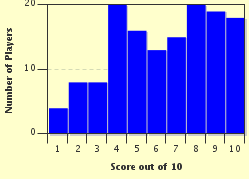Quiz Answer Key and Fun Facts
1. John 3:4 quotes a man being perplexed and asking questions of Jesus. The verse quotes him asking the following questions: "How can a man be born when he is old? Can he enter a second time into his mother's womb and be born?" Who asked the questions?
2. Mark 10:47 quotes a blind beggar shouting a number of times, "Jesus, Son of David, have mercy on me!" Who made the statement?
3. John 1:46 quotes a future disciple having severe doubts about Jesus being the Messiah. After learning Jesus is from Nazareth, the future disciple is quoted as saying: "Can anything good come out of Nazareth?" Who is the doubting disciple?
4. The sixth chapter of John tells of Jesus feeding 5,000 men with five loaves of bread and two small fish. Prior to the miracle, John 6:9 quotes a man as saying to Jesus: "There is a lad here who has five barley loaves and two small fish, but what are they among so many?" Who made the statement to Christ?
5. Who made the statement to Jesus in Luke 19:8: "Look, Lord, I give half of my goods to the poor; and if I have taken anything from anyone by false accusation, I restore fourfold."
6. The eleventh chapter of John tells of Jesus raising a man from the dead four days after his death. However, a person at the scene didn't want Jesus to remove the stone to the man's tomb because of a fear the body would be a stinking corpse. Who made the statement: "Lord, by this time there is a stench, for he has been dead four days."
7. Matthew 27:4 quotes a man as saying "I have sinned by betraying innocent blood." Who made the statement?
8. Who made this statement in Scripture: "God will strike you, you whitewashed wall! For you sit to judge me according to the law, and do you command me to be struck contrary to the law?"
9. According to Acts 3:6 in the NKJV, who told a crippled beggar, "Silver and gold I do not have, but what I do have I give you: In the name of Jesus Christ of Nazareth, rise up and walk."
10. Who made the statement "My Lord and my God!" to Christ in John 20:28?
Source: Author
Cowrofl
This quiz was reviewed by FunTrivia editor
LeoDaVinci before going online.
Any errors found in FunTrivia content are routinely corrected through our feedback system.

